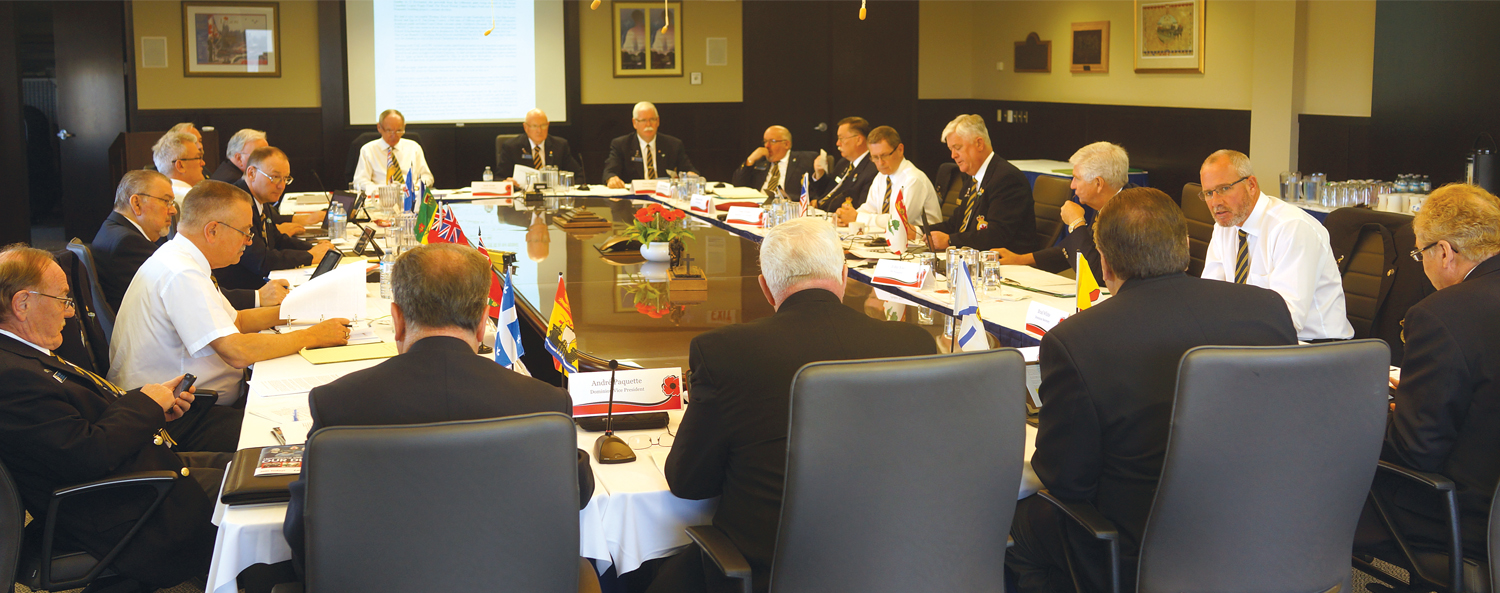It was a significant meeting April 16-17 when the Dominion Executive Council (DEC) convened to make some decisions that will help shape the future of the organization.
Grand President Larry Murray set the tone with his opening remarks. “This extended DEC prior to convention has always been an important gathering, but I believe that it’s particularly critical at this juncture in the history of the Legion. All of you and many others should be commended on the superb progress achieved in responding to the will of the 2014 convention by successfully implementing the dominion president’s deficit reduction plan.
“It’s great to see the potential creation of a special operational stress injury (OSI) section within the Legion being deliberated at this DEC meeting and hopefully becoming a historic reality in St. John’s.”
And that’s the big news from this DEC, which not only debated the creation of a new OSI special section within the Legion, but resoundingly passed a resolution to bring it forward at convention for approval by the membership.
The presentation on the OSI section was made by retired major-general Glynne Hines, who outlined how the section will work: while it won’t be in the business of providing health services, the OSI section will assist any veterans and their families who are affected by an OSI; it will attempt to de-stigmatize the public’s perception of OSI sufferers; and it will work to increase research into treatment and prevention.
“The Operational Stress Injury Special Section is a grassroots, member-driven initiative focused on ensuring that veterans and their families suffering from operational stress injuries get the medical care they need,” said Hines.
The Legion created a special section in 1925 when the Tuberculous Veterans’ Association became the Tuberculous Veterans’ Section of the Canadian Legion.
“The Legion responded in a historic manner after the First World War to the tuberculous situation,” said Murray. “I don’t think there’s anything dominating [veterans issues] more than to try to come to grips with how to deal with PTSD and related issues. It sends such a powerful signal that the largest veterans organization in the country cares and wants to deal with this in a special way. It’s a historic opportunity for the Legion, for Canada and for veterans and their families.”
Just before the vote, President Tom Eagles weighed in. “I think the OSI section and The Royal Canadian Legion go hand-in-hand, because helping veterans and their families is what we do.”
It was moved and unanimously accepted that the OSI special section be created, and given a seat at DEC, subject to a vote at the upcoming dominion convention.
President Eagles had a few big news items to deliver to DEC during his report as well. “I made it very clear that deficit financing would not be acceptable business,” he said, before going on to note that not only is Dominion Command avoiding a deficit for this year, it’s doing even better than that. This is “the first time Dominion Command has been able to register a surplus in a very, very long time,” he said.
The second big news item is the creation of a Legion National Foundation. The foundation will allow Dominion Command to issue tax receipts for all donations, which will hopefully spur a large increase in revenue. “I’m very happy to announce that we have a Legion National Foundation. The application has gone to the Canada Revenue Agency for final approval for charitable status.”
Dominion Treasurer Mark Barham delivered his report, confirming Eagles’ announcement and adding some details. “The 2015 budget process was changed to make all budgeting a zero-based approach, thereby assuring a continuous review of the bottom line,” said Barham. “That, coupled with stellar results from the Supply Department, a large number of years of service buyback by members, and an adequate return on our investments, yielded The Royal Canadian Legion just short of an $800,000 surplus. That money has been placed in the reserves and invested accordingly.
“This was a watershed year that took us from a previously projected deficit of over $1 million dollars to a surplus position,” said Barham, before noting that we have a projected surplus for 2016 as well.
DEC also agreed unanimously to a request that the Legion become a signature sponsor of the Invictus Games at a cost of $500,000. The games, which use sport to promote recovery and a greater understanding of injured and sick military personal, will be held in in Toronto in 2017.
On Sunday morning, Flannigan brought a motion to bring a resolution to convention which would reduce Legion memberships to three categories: Veteran, Associate and Member. After some debate the motion passed.
Nova Scotia/Nunavut brought forward the information that a group of members in that province was working to create a new kind of branch, one without alcohol or gaming that is dedicated to peer support for those suffering from an OSI.
Finally, while membership numbers are still on the decline—final 2015 membership was 285,321, down 4.5 per cent or 13,293 members over 2014—there was some reason for optimism. The membership section reported they processed 24,206 new or reinstated members to date in 2016. It is hoped that even more new members will join after the new membership system comes online this year, which allows members and branches direct access to memberships and membership information.
The Membership Committee also put forward a resolution that would create a complementary membership for cadets graduating from military colleges, albeit one that doesn’t include a subscription to Legion Magazine.
As the last order of business, the executive council got to spend a considerable amount of time with Chief of Defence Staff General Jonathan Vance, who came to Legion House to be inducted as an honorary vice-president of Dominion Command.
Advertisement






















